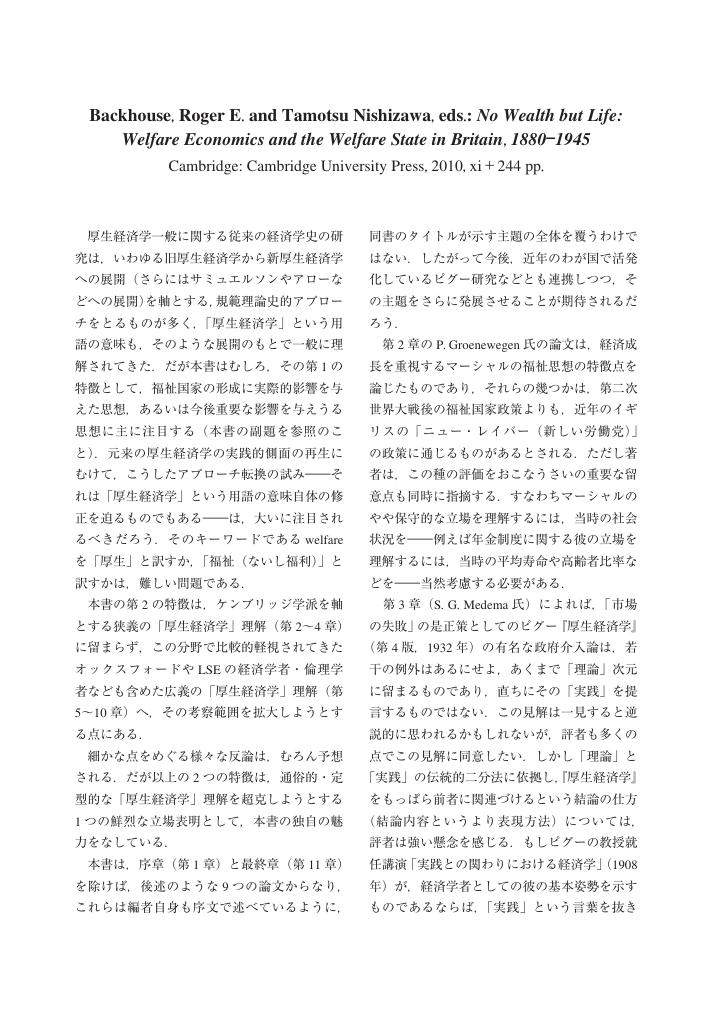- 著者
- 本郷 亮 Ryo Hongo
- 雑誌
- 経済学論究 = The journal of economics of Kwansei Gakuin University (ISSN:02868032)
- 巻号頁・発行日
- vol.71, no.1, pp.225-250, 2017-06-20
3 0 0 0 OA <翻訳>A.C.ピグー「古典派の定常状態」(1943 年) : 邦訳と解題
- 著者
- 本郷 亮 Ryo Hongo
- 雑誌
- 経済学論究 (ISSN:02868032)
- 巻号頁・発行日
- vol.67, no.2, pp.177-196, 2013-09-10
2 0 0 0 IR 渋沢栄一『論語と算盤』
- 著者
- 本郷 亮 Ryo Hongo
- 雑誌
- エコノフォーラム21 : 学生と教職員のインターコミュニケーション誌 = Econo forum 21
- 巻号頁・発行日
- no.21, pp.35, 2015-03-15
1 0 0 0 OA <翻訳>A.C. ピグー「善の問題」(1908 年) : 邦訳と解題
- 著者
- 本郷 亮 Ryo Hongo
- 雑誌
- 経済学論究 (ISSN:02868032)
- 巻号頁・発行日
- vol.67, no.1, pp.187-205, 2013-06-10
- 著者
- 本郷 亮
- 出版者
- 経済学史学会
- 雑誌
- 経済学史研究 (ISSN:18803164)
- 巻号頁・発行日
- vol.58, no.1, pp.171-172, 2016 (Released:2019-11-29)
- 著者
- 本郷 亮
- 出版者
- 経済学史学会
- 雑誌
- 経済学史研究 (ISSN:18803164)
- 巻号頁・発行日
- vol.54, no.1, pp.112-113, 2012 (Released:2019-10-31)
1 0 0 0 OA ピグーの『失業の理論』
- 著者
- 本郷 亮
- 出版者
- The Japanease Society for the History of Economic Thought
- 雑誌
- 経済学史研究 (ISSN:18803164)
- 巻号頁・発行日
- vol.48, no.1, pp.63-77, 2006-06-30 (Released:2010-08-05)
- 参考文献数
- 49
The purpose of this paper is to reexamine the significance for wage policy and theory of The Theory of Unemployment (1933). A. C. Pigou (1877-1959) began to study unemployment problems before World War I. He often advocated “direct state action” to lessen unemployment by increasing government expenditure. After the war, however, increasingly he viewed direct action by government as something to be exercised selectively and with caution. According to Pigou, the causes of unemployment in the 1920s were to be found not in a shortage of aggregate labor demand but primarily in the high wage-rates of some industries.In other words, he shifted the approach to unemployment from the labor demand side to the labor supply side. That change in analytical starting point shows up clearly in Pigou's “Wage Policy and Unemployment” (1927). In that article he maintains, “If it is correct-if, that is to say, post-war wage policy is in fact responsible for adding some 5 per cent to the volume of unemployment which is normally brought about by other factors-the country is confronted with a problem of a type which pre-war economics never found itself called upon study.” Pigou's study of unemployment in relation to wage policies crystallized in 1933 into The Theory of Unemployment, in which his chief objective was to shed light on unemployment as an outcome of causative factors originating in the labor supply side.My main conclusions are three: (1) Pigou's theory of unemployment developed and changed through at least two stages; (2) In the late 1920s Pigou began to emphasize the importance of wage policy as a dominant cause of the unemployment at that time; and (3) The Theory of Unemployment contained some arguments similar to the natural unemployment-rate hypothesis, which was popular in the 1970s.
1 0 0 0 OA 初期ピグーの再評価
- 著者
- 本郷 亮
- 出版者
- The Japanese Society for the History of Economic Thought
- 雑誌
- 経済学史学会年報 (ISSN:04534786)
- 巻号頁・発行日
- vol.39, no.39, pp.116-127, 2001 (Released:2010-08-05)
- 参考文献数
- 18
This paper deals with A. C. Pigou's economic thought before the World War I, especially in relation to Liberal Reform (1906-11). Pigou was very interested in the Royal Commission on the Poor Law and Relief of Distress. He submitted “Memorandum on some Economic Aspects and Effects of Poor Law Relief” to the Royal Commission in 1907. In this “Memorandum”, we can distinguish his two welfare criteria: the size and distribution of the national dividend. His motives to write Wealth and Welfare (1912) could be mainly found in those years.The National Insurance Act (1911) was one of the most epoch-making laws during this period. Pigou examined this institution in his book Wealth and Welfare because labour problems, including destitution and unemployment, were an urgent economic theme for him and his contemporaries. In Unemployment (1913) he considered that not only public works as means for relieving unemployment among the poor, but also insurance and National-Minimum were necessary. Liberal Reform was an essential background of Pigou's welfare economics.
1 0 0 0 OA ケインズ「わが孫たちの経済的可能性」について
- 著者
- 本郷 亮
- 出版者
- 弘前学院大学社会福祉学部
- 雑誌
- 弘前学院大学社会福祉学部研究紀要 (ISSN:13464655)
- 巻号頁・発行日
- no.5, pp.27-36, 2005-03-01
1 0 0 0 OA ケンブリッジ、オクスフォード、LSEの経済思想と現代福祉国家の変容
19世紀末以降のケンブリッジ、オクスフォード、LSEの経済思想の展開を、現代福祉国家の変容・危機を視野に入れて、共同研究を進め成果を得た。具体的には、1. 「創設期の厚生経済学と福祉国家」から厚生経済学史の再検討へ、2. リベラリズムの変容と福祉国家-ニュー・リベラリズムからネオ・リベラリズムへ、3. マーシャル、ケインズと同時代の経済思想、4. ケインズと現在の世界経済危機-戦間期との比較考証、の4点を中心に国際共同研究を進め成果を得た。

